
Benjamin Disraeli, 1st Earl of Beaconsfield, was a British statesman, Conservative politician and writer who twice served as Prime Minister of the United Kingdom. He played a central role in the creation of the modern Conservative Party, defining its policies and its broad outreach. Disraeli is remembered for his influential voice in world affairs, his political battles with the Liberal Party leader William Ewart Gladstone, and his one-nation conservatism or "Tory democracy". He made the Conservatives the party most identified with the British Empire and military action to expand it, both of which were popular among British voters. He is the only British Prime Minister to have been born Jewish.

Mary Anne Disraeli, 1st Viscountess Beaconsfield was a British peeress and society figure who was the wife of the British statesman Benjamin Disraeli.

Beaconsfield is a market town and civil parish in Buckinghamshire, England, 23+1⁄2 miles northwest of central London and 16 miles southeast of Aylesbury. Three other towns are within five miles : Gerrards Cross, Amersham and High Wycombe.

Hughenden Valley is an extensive village and civil parish in Buckinghamshire, England, just to the north of High Wycombe. The civil parish is still named Hughenden as of 2024. It is almost 8,000 acres (32 km2) in size, divided mainly between arable and wooded land. It is situated 3 miles (4.8 km) north of central Wycombe, 12.5 miles (20.1 km) south of the county town of Aylesbury and some 35 miles (56 km) west-northwest of London.
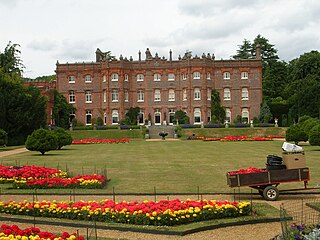
Hughenden Manor, Hughenden, Buckinghamshire, England, is a Victorian mansion, with earlier origins, that served as the country house of the Prime Minister, Benjamin Disraeli, 1st Earl of Beaconsfield. It is now owned by the National Trust and open to the public. It sits on the brow of the hill to the west of the main A4128 road that links Hughenden to High Wycombe.

Gathorne Gathorne-Hardy, 1st Earl of Cranbrook, was a prominent British Conservative politician. He held cabinet office in every Conservative government between 1858 and 1892. He served as Home Secretary from 1867 to 1868, Secretary of State for War from 1874 to 1878, Lord President of the Council from 1885 to 1886 and as Chancellor of the Duchy of Lancaster until 1886. In 1878, he was appointed Secretary of State for India and thereafter was elevated to the peerage, entering the House of Lords as Viscount Cranbrook. He has been described as a moderate, middle-of-the-road Anglican, and a key ally of Disraeli.

Viscount Cobham is a title in the Peerage of Great Britain that was created in 1718. Owing to its special remainder, the title has passed through several families. Since 1889, it has been held by members of the Lyttelton family.
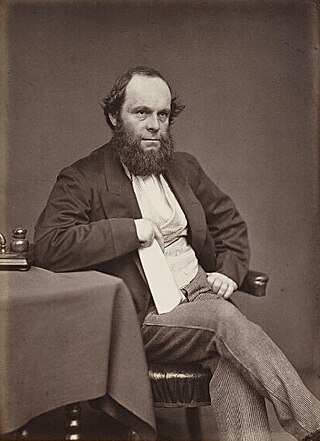
Richard Plantagenet Campbell Temple-Nugent-Brydges-Chandos-Grenville, 3rd Duke of Buckingham and Chandos,, styled Earl Temple until 1839 and Marquess of Chandos from 1839 to 1861, was a British soldier, politician and administrator of the 19th century. He was a close friend and subordinate of Benjamin Disraeli and served as the secretary of state for the colonies from 1867 to 1868 and governor of Madras from 1875 to 1880.

Benjamin Disraeli was appointed Prime Minister of the United Kingdom for a second time by Queen Victoria after William Ewart Gladstone's government was defeated in the 1874 general election. Disraeli's foreign policy was seen as immoral by Gladstone, and following the latter's Midlothian campaign, the government was heavily defeated in the 1880 general election, whereupon Gladstone formed his second government. The ailing Disraeli, by now created Earl of Beaconsfield, died in April 1881.

Montagu William Lowry-Corry, 1st Baron Rowton,, also known as "Monty", was a British philanthropist and public servant, best known for serving as Benjamin Disraeli's private secretary from 1866 until the latter's death in 1881.
Buckinghamshire is a former United Kingdom Parliamentary constituency. It was a constituency of the House of Commons of the Parliament of England then of the Parliament of Great Britain from 1707 to 1800 and of the Parliament of the United Kingdom from 1801 to 1885.

Coningsby Ralph Disraeli, was a British Conservative politician, and MP for Altrincham.
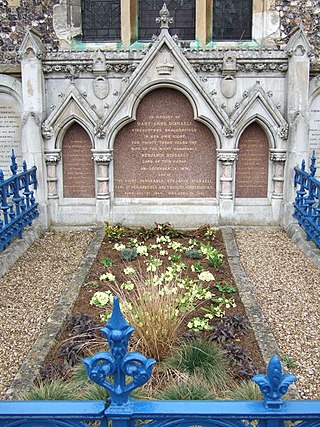
Primrose Day marked the anniversary of the death of the British statesman and prime minister Benjamin Disraeli, 1st Earl of Beaconsfield, on 19 April 1881. The day was marked each year into the 1920s, with arrangements of primroses left at Disraeli's tomb at St Michael and All Angels Church, Hughenden and his statue in Parliament Square and many supporters wearing primroses as buttonholes, garlands, and hat decorations.
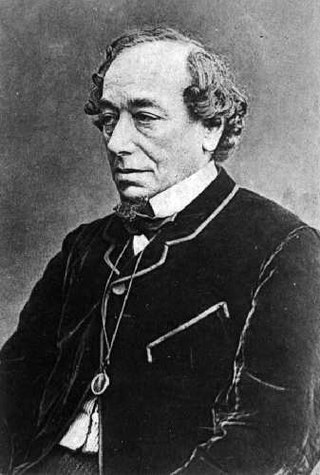
The Buckinghamshire by-election, conducted on 22 September 1876, was held when Prime Minister Benjamin Disraeli was raised to the peerage as the Earl of Beaconsfield. It was won by the Conservative candidate, Thomas Fremantle, with a majority of 186 over the Liberal Party.
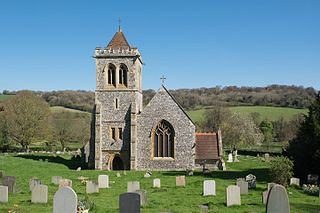
St Michael and All Angels' Church is a Grade: II* listed Anglican church in the Hughenden Valley, Buckinghamshire, England, near to High Wycombe. It is closely associated with the nearby Hughenden Manor and the former Prime Minister of the United Kingdom, Benjamin Disraeli who is buried in the churchyard.

The statue of Benjamin Disraeli is an outdoor bronze sculpture by Mario Raggi, located at the west side of Parliament Square in London. It was unveiled in 1883 and became a Grade II listed building in 1970.
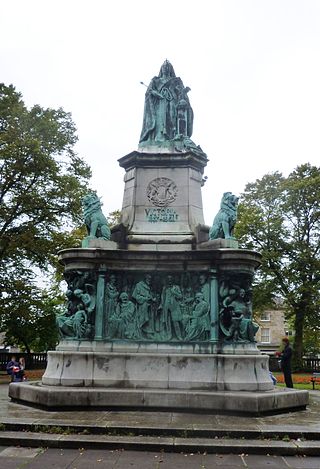
The Queen Victoria Memorial in Lancaster, Lancashire, England, is a Grade II* listed building. It stands in the centre of Dalton Square, facing Lancaster Town Hall. It was erected in 1906, being commissioned and paid for by James Williamson, 1st Baron Ashton.

The Disraeli Monument is a Grade II* listed memorial erected in 1862 to the British writer and scholar Isaac D'Israeli, designed by the architect Edward Buckton Lamb. It is located on Tinker's Hill in the Hughenden Valley near High Wycombe in Buckinghamshire.
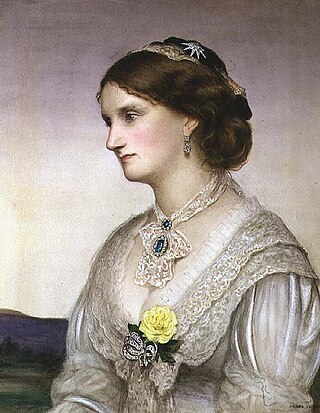
Selina Louisa Bridgeman, Countess of Bradford born Selina Louise Weld-Forester was a British peeress. Prime minister Benjamin Disraeli was her admirer and he wrote her over 1,000 letters.

Portrait of Benjamin Disraeli is an 1852 portrait painting by the British artist Francis Grant. It depicts Benjamin Disraeli, a Conservative politician and future Prime Minister. The same year Disraeli was appointed Chancellor of the Exchequer in the Tory Government of the Earl of Derby.

















